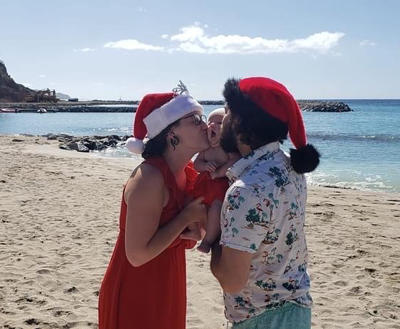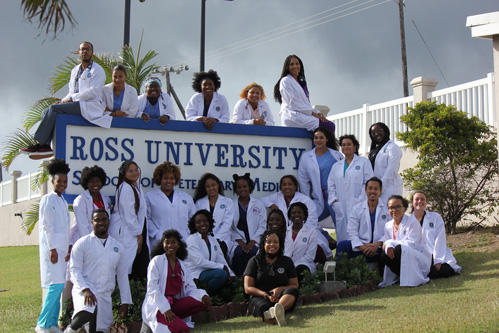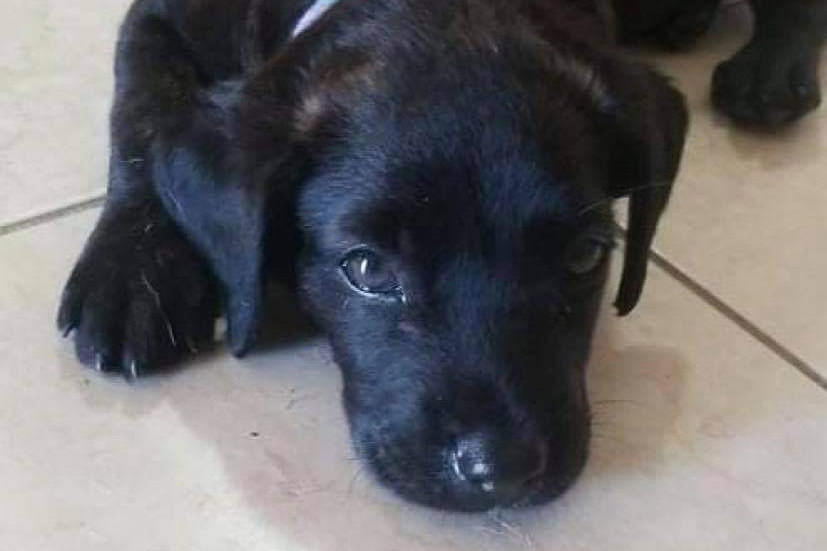“I adopted a three-legged cat,” Jaymee remarks during our Zoom® call while sitting in a bright, airy room on the Caribbean island of St. Kitts. A cat perch is visible on the right side of the computer screen, surrounded by light filtered through an off-screen window. “Almost every student has adopted an animal,” Jaymee tells us before confessing that a pet cat was left at home because of COVID restrictions.
We asked Jaymee, a fifth semester doctor of veterinary medicine (DVM) student at Ross University School of Veterinary Medicine (RUSVM), to answer the question, what is veterinary school like? And it became clear that while Ross Vet’s DVM program is accredited by the American Veterinary Medicine Association (AVMA) and provides the same didactic training as other vet schools, it’s the environment and culture of St. Kitts that add a unique depth and shine to the vet school experience.
Jaymee pointed out that because Ross Vet does not have a veterinary teaching hospital, DVM students spend 2 years and 4 months working through didactic preclinical courses at Ross Vet, followed by a one-year clinical experience at an affiliated veterinary teaching hospital in a different location. However, Jaymee said this doesn’t mean that Ross Vet students never handle animals or provide hands-on care.
In this blog post, we’ll walk with Jaymee through a day in the life of a vet student at Ross Vet. We’ll also discuss some of the courses that make up the DVM curriculum and how Ross Vet prepares students for their clinical year. We’ll then talk with Jaymee about how Ross Vet provides opportunities to gain direct animal care experience and gives back to the St. Kitts island community.
Come explore with us!
The Daily Routine of a Vet Student at Ross Vet
Jaymee, whose pronouns are they/them, wakes at 6:30 am and usually attends lectures from 8 am to noon. The courses include toxicology, anesthesiology, diagnostic imaging, and small animal medicine. One class that runs continuously through the curriculum is Essential Veterinary Skills. This course provides progressively more complex instruction and practical experience in the foundational skills necessary for veterinary practice.
In addition to the usual lectures, Jaymee spent time on this particular morning drawing blood from donkeys as part of a research project. Research projects and spay/ neuter clinics are part of the extracurricular offerings available to Ross Vet students. Even first semester students participate in spay/ neuter clinics, giving them valuable animal exposure and practical, hands-on experience.
Ross Vet offers more than 25 student clubs and organizations, many offering opportunities to gain additional hands-on experience, complementing and enhancing the classroom teachings. The pathology club, for instance, provides students with the opportunity to do necropsies, or animal autopsies, and allows students to draw blood or take vitals on sheep used for anesthesia labs and castration surgeries. As part of the diagnostic imaging club, students have the opportunity to learn about and practice doing ultrasounds on sheep as one of the activities.
At noon, Jaymee breaks for lunch, a communal meal sometimes centered around a guest lecture on campus, and then labs follow in the afternoons. Jaymee had a diagnostic imaging lab this afternoon which teaches students to operate X-ray and ultrasound machines and using them to help diagnose disorders. Another day, Jaymee had an anesthesia lab where students learned to assemble the anesthesia machine. This lab culminates with students anesthetizing a sheep.
After classes finish for the day, Jaymee spends the afternoon and evening writing summary notes and making flashcards from the day’s content. Because fifth semester courses give tests on Tuesdays, Jaymee tries to relax a bit on Tuesday evenings and might visit the beach for some much-deserved rest and relaxation.
What Is Veterinary School Like at Ross Vet?
When asked to explain what is veterinary school like at Ross Vet, Jaymee told us that “the first few semesters were like the last few semesters of undergrad [studies], but on fast forward. There’s more content [and it’s covered] a lot quicker.” As a fifth semester student who wears scrubs and totes a stethoscope to labs, Jaymee said “I finally feel like I’m going to be a doctor.”
We asked Jaymee, “What do you do in vet school?” It turns out that the didactic portion of vet school is similar to a student’s undergrad years—lots of studying, attending lectures, and preparing for labs. What’s different is the availability of extracurricular research projects and clubs that provide valuable group support and hands-on learning experiences for students.
What Do You Learn in Veterinary School at Ross Vet?
So just what does a vet student learn in veterinary school at Ross Vet? “The first two semesters cover what is normal, as in anatomy, physiology, and microanatomy. The next two semesters cover what is abnormal, in classes such as pathology, bacteriology, virology, and parasitology,” explained Jaymee.
As a fifth semester student, Jaymee is learning to apply the knowledge learned in the first four semesters—in other words, to diagnose and treat animals. During the remaining two semesters, Jaymee will continue to take courses and labs, expanding on the knowledge needed to embark on the final phase of vet school—a clinical year at a teaching hospital.
What Is Veterinary School Like at Ross Vet Outside of Classes?
We asked Jaymee if students have time for activities beyond the DVM curriculum. They told us, “There’s time if you make time.” Jaymee has obtained a scuba certification and hiked the island’s volcano. Other island activities include riding ATVs, visiting the beaches, participating in water sports, snorkeling, and going out with friends.
Jaymee made sure to stress that extracurricular experiences make the Ross Vet student experience stand out as unique and valuable. In addition to the activities listed above, they told us that Ross Vet students participate in such activities as:
- Sea turtle monitoring project
- Feral cat project
- Opportunities unique to attending an island vet school, such as a necropsy on a beached whale
- Scuba diving club
- Kite sailing club
So what about the three-legged cat that Jaymee adopted? The residents of St. Kitts treasure their island’s animal population but often don’t have the resources to spay or neuter their pets. Some of the animals live as strays on the Ross Vet campus and are cared for by the staff and students. Others are adopted by students. Jaymee said there are five or six community spay/ neuter projects occurring this semester alone, providing surgeries for stray cats as well as discounted or free procedures for personal pets. These projects are part of Ross Vet’s commitment to give back to the community that supports the vet school. And according to Jaymee, they are just a few of the activities that make Ross Vet a unique and attractive choice for vet school applicants.
For prospective vet students who were wondering what is vet school like at Ross Vet, you now have a better idea. And if you are ready for your own day in the life of a vet student on a beautiful Caribbean island, apply to Ross Vet today!
Related resources:
*Ross University School of Veterinary Medicine's (RUSVM) Veterinary Clinic is accredited by the American Association for Accreditation of Laboratory Animal Care (AAALAC, www.aaalac.org) as a school. The accreditation focuses on animals used in teaching and research environments.
RUSVM received full accreditation on July 16, 2019, from AAALAC International, an organization that promotes the humane treatment of animals in science through voluntary accreditation and assessment programs.






